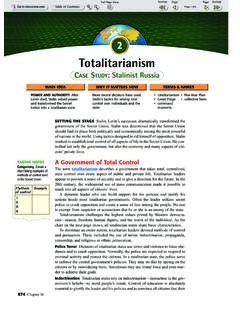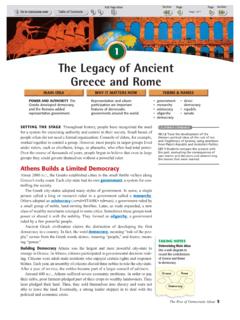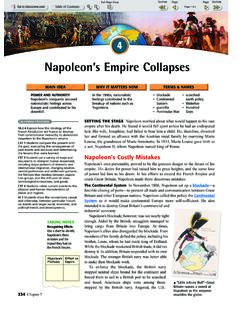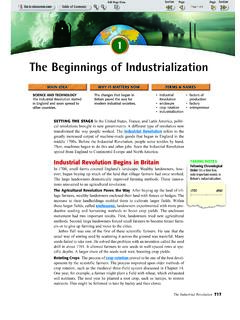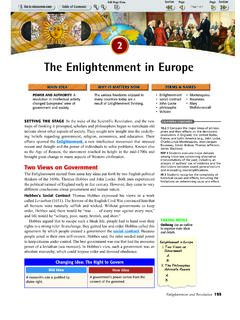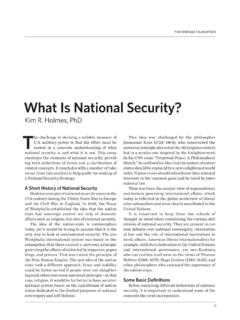Transcription of The Congress of Vienna - History With Mr. Green
1 Recognizing EffectsUse a chart to show howthe three goalswof Metternich s plan atthe Congress of Viennasolved NOTESM etternich's PlanProblemSolution672 Chapter 23 MAIN IDEAWHY IT MATTERS NOWTERMS & NAMESPOWER AND AUTHORITYA fterexiling Napoleon, Europeanleaders at the Congress ofVienna tried to restore orderand reestablish bodies such as theUnited Nations play an activerole in trying to maintain worldpeace and stability today. Congress ofVienna Klemens vonMetternich balance of power legitimacy Holy Alliance Concert ofEurope5 SETTING THE STAGEE uropean heads of government were looking toestablishlong-lasting peace and stability on the continent after the defeat ofNapoleon.
2 They had a goal of the new European order one of collective secu-rity and stability for the entire continent. A series of meetings in Vienna , knownas the Congress of Vienna , were called to set up policies to achieve this , the Congress of Vienna was scheduled to last for four weeks. Instead,it went on for eight s Plan for EuropeMost of the decisions made in Vienna during the winter of 1814 1815 weremade in secret among representatives of the five great powers Russia,Prussia, Austria, Great Britain, and France. By far the most influential of theserepresentatives was the foreign minister of Austria, Prince Klemens vonMetternich(MEHT uhr nihk).
3 Metternich distrusted the democratic ideals of the French Revolution. Likemost other European aristocrats, he felt that Napoleon s behavior had been a nat-ural outcome of experiments with democracy. Metternich wanted to keep thingsas they were and remarked, The first and greatest concern for the immensemajority of every nation is the stability of laws never their change. Metternichhad three goals at the Congress of Vienna . First, he wanted to prevent futureFrench aggression by surrounding France with strong countries. Second, hewanted to restore a balance of power, so that no country would be a threat toothers.
4 Third, he wanted to restore Europe s royal families to the thrones they hadheld before Napoleon s conquests. The Containment of FranceThe Congress took the following steps to makethe weak countries around France stronger: The former Austrian Netherlands and Dutch Republic were united to form theKingdom of the Netherlands. A group of 39 German states were loosely joined as the newly createdGerman Confederation, dominated by Austria. Switzerland was recognized as an independent nation. The Kingdom of Sardinia in Italy was strengthened by the addition Congress of ViennaThese changes enabled the countries of Europe to contain France and prevent itfrom overpowering weaker nations.
5 (See the map on page 674.)Balance of PowerAlthough the leaders of Europe wanted to weaken France, theydid not want to leave it powerless. If they severely punished France, they mightencourage the French to take revenge. If they broke up France, then another coun-try might become so strong that it would threaten them all. Thus, the victoriouspowers did not exact a great price from the defeated nation. As a result, Franceremained a major but diminished European power. Also, no country in Europecould easily overpower great powers affirmed the principle oflegitimacy agreeing thatas many as possible of the rulers whom Napoleon had driven from their thrones berestored to power.
6 The ruling families of France, Spain, and several states in Italyand Central Europe regained their thrones. The participants in the Congress ofVienna believed that the return of the former monarchs would stabilize politicalrelations among the Congress of Vienna was a political triumph in many ways. For the first time,the nations of an entire continent had cooperated to control political affairs. Thesettlements they agreed upon were fair enough that no country was left bearing agrudge. Therefore, the Congress did not sow the seeds of future wars.
7 In that sense,it was more successful than many other peace meetings in agreeing to come to one another s aid in case of threats to peace, theEuropean nations had temporarily ensured that there would be a balance of poweron the continent. The Congress of Vienna , then, created a time of peace in was a lasting peace. None of the five great powers waged war on one another fornearly 40 years, when Britain and France fought Russia in the Crimean War. Political Changes Beyond ViennaThe Congress of Vienna was a victory for conservatives. Kings and princesresumed power in country after country, in keeping with Metternich s , there were important differences from one country to and France now had constitutional monarchies.
8 Generally speaking, how-ever, the governments in Eastern and Central Europe were more conservative. Therulers of Russia, Prussia, and Austria were absolute French Revolution and Napoleon673 DrawingConclusionsIn what wayswas the Congressof Vienna a success? Delegates at theCongress of Viennastudy a map 23 Conservative EuropeThe rulers of Europe were very nervous about the legacy ofthe French Revolution. They worried that the ideals of liberty, equality, and frater-nity might encourage revolutions elsewhere. Late in 1815, Czar Alexander I,Emperor Francis I of Austria, and King Frederick William III of Prussia signed anagreement called the Holy Alliance.
9 In it, they pledged to base their relations withother nations on Christian principles in order to combat the forces of , a series of alliances devised by Metternich, called the Concert of Europe,ensured that nations would help one another if any revolutions broke Europe, conservatives held firm control of the governments, but theycould not contain the ideas that had emerged during the French Revolution. Franceafter 1815 was deeply divided politically. Conservatives were happy with themonarchy of Louis XVIII and were determined to make it last.
10 Liberals, however,wanted the king to share more power with the legislature. And many people in thelower classes remained committed to the ideals of liberty, equality, and , in other countries there was an explosive mixture of ideas and factionsthat would contribute directly to revolutions in 1830 and 1848. Despite their efforts to undo the French Revolution, the leaders at the Congress ofVienna could not turn back the clock. The Revolution had given Europe its firstexperiment in democratic government. Although the experiment had failed, it had setnew political ideas in motion.

